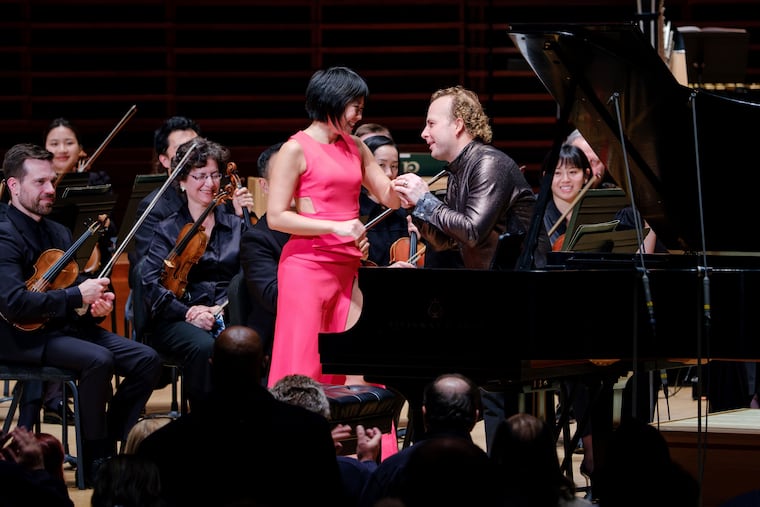Yuja Wang dazzled in Tchaikovsky. But here’s what some listeners missed.
The Philadelphia Orchestra brought back an incredible piece for the first time since its Dec. 1937 premiere.

They came to hear Yuja, and then they left. Philadelphians may rightly feel they’re on a first-name basis with the pianist, who grew up here musically, so perhaps all they were seeking was a quick liaison.
But by leaving Thursday night’s Philadelphia Orchestra program in Marian Anderson Hall at intermission after Yuja Wang’s appearance, as many did, listeners missed a piece with important local credentials they’re unlikely to encounter again.
These concerts mark the first time William Grant Still’s Symphony No. 2 (“Song of a New Race”) has been played by the Philadelphia Orchestra since the group and conductor Leopold Stokowski premiered the work in December 1937. It’s a score that roars and purrs, and whose melding of Black sources with a Hollywood aesthetic adds up to some incredible emotional firepower.
Still — whose life began in Mississippi in the 19th century and stretched to Los Angeles in 1978 — had a great ear for melody. The opening of the second symphony’s second movement recalls the Jerome Kern/Dorothy Fields song “The Way You Look Tonight” from the same era (around 1936). Another listener will detect a bluesy influence, no doubt, but all meet in a lush, easy realm dominated by saturated strings and pastoral winds — a lovely place to be. The last movement is at its best when it’s in full-throated declarative mode, and here the drama aligned nicely with that of Yannick Nézet-Séguin.
One senses the conductor’s sympathies for this material begin with its origins in vocal music, as is the case with Margaret Bonds’ The Montgomery Variations, based on the spiritual “I Want Jesus to Walk with Me.” Written in 1964 and inspired by the Rev. Dr. Martin Luther King Jr. and events in the Civil Rights Movement, the work provides a lot to unpack even in the subtitles of the seven variations (“Lament” is about the bombing of 16th Street Baptist Church in 1963). Through mood, her shaping of melody and very 1960s orchestrations, Bonds delivers the listener to a specific time in history with remarkable sharpness.
If Tchaikovsky’s Piano Concerto No. 1 seems incongruous with the rest of the program, well, at least Wang beautifully draws a separate universe around herself. She does this in part because she’s a bit of a tease. She made her fans wait an enormously long time applauding for an encore before she gave them one — Arturo Márquez’s Danzón No. 2, which actually is much more effective in its percussion-propelled orchestral version and should have been played by the ensemble.
Wang also teases in her phrasing, holding out certain notes (a suspension) until your ear is practically begging for resolution. Her gifts are well-known and on this night they were in full force: the thunderous sound, jaw-dropping runs, and a personal approach to phrasing.
The pianist is a thrill. But it was hard not to be just as impressed by the orchestra, and in particular its instrument soloists in the second movement — bassoonist Mark Gigliotti, hornist Jeffrey Lang, oboist Peter Smith, and cellist Hai-Ye Ni. This orchestra has a concept of sound in Tchaikovsky like few others, and nothing outshines that.
Additional performances: Friday and Saturday at 8 p.m., Marian Anderson Hall, Broad and Spruce Sts. Tickets are $66-$214. www.ensembleartsphilly.org, 215-893-1999.